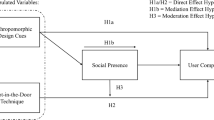Abstract
The central thesis of this paper is that human unconscious processes influence the behavior and design of artificial intelligence (AI). This thesis is discussed through the case study of a chatbot called Replika, which intends to provide psychological assistance and friendship but has been accused of inciting murder and suicide. Replika originated from a trauma and a work of mourning lived by its creator. The traces of these unconscious dynamics can be detected in the design of the app and the narratives about it. Therefore, a process of de-psychologization and de-humanization of the unconscious takes place through AI. This psychosocial approach helps criticize and overcome the so-called “standard model of intelligence” shared by most AI researchers. It facilitates a new interpretation of some classic problems in AI, such as control and responsibility.

Similar content being viewed by others
Notes
“A complex is a group of partially or totally unconscious psychic content (representations, memories, fantasies, affects, and so on), which constitutes a more or less organized whole, such that the activation of one of its components leads to the activation of others” (De Mijolla 2002, 318).
See the video: https://www.youtube.com/watch?v=yQGqMVuAk04
Bird and Green (2020) have stressed the importance of Fisher’s work for psycho-social analysis.
References
Albert M, Lee Kleinman D (2011) Bringing Pierre Bourdieu to science and technology studies. Minerva 49(3):263–273
Ames M-G (2018) Deconstructing the algorithmic sublime. Big Data Soc 5:1–4
Balazka D, Rodighiero D (2020) Big data and the little big bang: an epistemological revolution. Front Big Data 3(31)
Bird J, Green D (2020) Capitalist realism and its psycho-social dimensions. In: Psychoanal Cult Soc 25:283–293
Bostrom N (2014) Superintelligence: paths, dangers, strategies. Oxford University Press, Oxford
Bourdieu P (1980) Le sens pratique. Minuit, Paris
Bourdieu P (1982) Ce que parler veut dire. Fayard, Paris
Bourdieu P (1997) Méditations pascaliennes. Seuil, Paris
Christin A (2018) Algorithms in practice: comparing web journalism and criminal justice. Big Data Soc 5:1–4
Christian B (2020) The Alignment Problem. Norton & Company, New York
Coeckelberg M (2020a) AI Ethics. The MIT Press, Cambridge, MA
Coeckelberg M (2020b) Artificial intelligence, responsibility attribution, and a relational justification of explainability. Sci Eng Ethics 26:2051–2068
Coeckelberg M, Reijers W (2020) Narrative and technology ethics. Palgrave Macmillan, New York-London
De Mijolla A (2002) Dictionnaire international de la psychanalyse. Calmann-Levy, Paris
Elliott A (2015) Identity troubles: an introduction. Routledge, London
Fisher M (2009) Capitalist realism: is there no alternative? Zero Books, London
Fisher M (2016) The weird and the eerie. Repeater Books, London
Freud S.(1915) 1953–74. The Standard Edition of the Complete Psychological Works of Sigmund Freud. Vol. XIV (On the History of the Psychoanalytic Movement; Papers on Metapsychology, and Other Works). London: Hogarth
Geiger RS (2018) Beyond opening up the black box. Big Data Soc 5:1–4
Gillespie T (2014) The relevance of algorithms. In: Gillespie T, Boczkowski PJ, Foot KA (eds) Media technologies: essays on communication, materiality, and society. The MIT Press, Cambridge, MA, pp 167–194
Héran F (1987) La seconde nature de l’habitus. Tradition philosophique et sens commun dans le langage sociologique. Rev Fr Sociol 28(3):385–416
Introna LD (2015) Algorithms, governance, and governmentality: on governing academic writing. Sci Technol Human Values 41(1):17–49
Jorion P (2021) An unconscious path to an artificial general intelligence: a roadmap (unpublished manuscript)
Koselleck R (1998) The Practice of Conceptual History. Stanford University Press, Redwood City
Lagoze C (2014) Big data, data integrity, and the fracturing of the control zone. Big Data Soc 1:1–11
Lee MK (2018) Understanding perception of algorithmic decisions: fairness, trust, and emotion in response to algorithmic management. Big Data Soc 5:1–11
Marino M (2020) Critical Code Studies. The MIT Press, Cambridge, MA
Miyazaki S (2016) Algorhythmic ecosystems: neoliberal couplings and their pathogenesis 1960–present. In: Seyfert R, Roberge J (eds) Algorithmic cultures. Routledge, London, pp 20–32
Minsky M (2013) Why freud was the first good ai theorist. In: More M, Vita-More N (eds) The transhumanist reader. Wiley, New York
Papilloud C (2018) Sociology through relation. theoretical assessments from the french tradition. Palgrave, London-New York
Possati L (2021) The algorithmic unconscious. how psychoanalysis helps in understanding AI. Routledge, London-New York
Rahwan I, Cebrian M, Obradovich O, Bongard J, Bonnefon J-F, Breazeal C, Crandall J, Christakis N, Couzin I, Jackson MO, Jennings N, Kamar E, Kloumann I, Larochelle H, Lazer D, McElreath R, Mislove A, Parkes D, Pentland A, Roberts M, Shariff A, Tenenbaum J, Wellman M (2019) Machine Behavior. Nature 568:477–486
Ricoeur P (1983) Temps et récit 1. Seuil, Paris
Romele A (2020) Technological capital: Bourdieu, postphenomenology, and the philosophy of technology beyond the empirical turn. Philos Technol. https://doi.org/10.1007/s13347-020-00398-4
Russell S (2019) AI compatible. Random House, New York
Seaver N (2017) Algorithms as Culture: Some Tactics for the Ethnography of Algorithmic Systems. Big Data Soc 4:1–12
Sennett R (1998) The corrosion of character, the personal consequences of work in the new capitalism. Norton, New York-London
Shaw R (2015) Big data and reality. Big Data Soc 2:1–4
Stern J (2010) Bourdieu, technique, and technology. Cult Stud 17(3–49):367–389
Tegmark M (2017) Life 3.0. Being Human in the Age of Artificial Intelligence. New York: Basic Books
Turkle S (1988) Artificial intelligence and psychoanalysis: a new alliance. Daedalus 117(1):241–268
Verbeek PP (2008) Morality in design: design ethics and the morality of technological artifacts. In: Philosophy and Design. Springer, Dordrecht
Vial S (2019) Being and the screen. The MIT Press, Cambridge, MA
Author information
Authors and Affiliations
Corresponding author
Additional information
Publisher's Note
Springer Nature remains neutral with regard to jurisdictional claims in published maps and institutional affiliations.
Rights and permissions
About this article
Cite this article
Possati, L.M. Psychoanalyzing artificial intelligence: the case of Replika. AI & Soc 38, 1725–1738 (2023). https://doi.org/10.1007/s00146-021-01379-7
Received:
Accepted:
Published:
Issue Date:
DOI: https://doi.org/10.1007/s00146-021-01379-7



